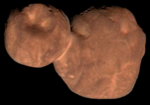WD 0145+234
Appearance
| Observation data Epoch J2000.0 Equinox J2000.0 | |
|---|---|
| Constellation | Aries[1] |
| Right ascension | 01h 47m 54.81s[2][3] |
| Declination | +23° 39′ 43.6″[2][3] |
| Apparent magnitude (V) | 11.64[4] |
| Characteristics | |
| Spectral type | DA[2] |
| Astrometry | |
| Distance | 98.08 ly (29.458[3] pc) |
| Details | |
| Temperature | 12910[2] K |
| Other designations | |
WD 0145+234; 2MASS J01475481+2339437; 1SWASP J014754.80+233943.8; Gaia DR2 291057843317534464; CHSS 3403; Mrk 362; WD 0145+23 | |
| Database references | |
| SIMBAD | data |
WD 0145+234 is a white dwarf star approximately 95 ly (29 pc)[3] from Earth in the constellation of Aries that has been associated with studies suggesting that a very large exoasteroid near the star was substantially disrupted, resulting in a considerable amount of dust and debris around the star.[3][5] Studies seem to have captured, for the first time, an exoasteroid breakup around the actual time interval of the disruption event.[3][5]

Exoasteroid disrupted by star (artist concept)
See also
References
- ^ Staff (2 August 2008). "Finding the constellation which contains given sky coordinates". DJM.cc. Retrieved 29 August 2019.
- ^ a b c d Staff (2019). "WD 0145+234". SIMBAD. Retrieved 17 October 2019.
- ^ a b c d e f Wang, Ting-gui; et al. (10 October 2019). "An On-going Mid-infrared Outburst in the White Dwarf 0145+234: Catching in Action of Tidal Disruption of an Exoasteroid?". arXiv:1910.04314v1 [astro-ph.SR].
- ^ Staff (2019). "WD0145+234". Villanova University. Retrieved 17 October 2019.
- ^ a b Letzer, Rafi (17 October 2019). "An Asteroid-Smashing Star Ground a Giant Rock to Bits and Covered Itself in the Remains". LiveScience. Retrieved 17 October 2019.



